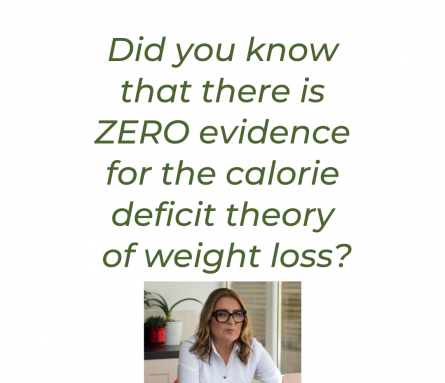For decades, we've been told that to lose weight, we need to eat fewer calories than we burn.
This idea rests on the so-called "3,500 calorie formula", the belief that a deficit of 3,500 calories equals one pound of fat loss. It's the foundation of virtually all mainstream weight loss advice. But what if I told you there is no scientific proof to support this theory?
That’s exactly what Zoe Harcombe, an obesity researcher set out to uncover in 2009. She approached a series of top UK health organisations, including the NHS, British Dietetic Association (BDA), NICE (National Institute for Clinical Excellence), the Department of Health, and the National Obesity Forum (NOF), with a simple question: where did the 3,500-calorie rule come from, and what evidence supports it?
The answers were shocking because there weren’t any.
No One Can Prove the Formula
The BDA responded, admitting they had no information on the origin of the 3,500 formula. Dietitians at an obesity conference couldn’t explain it either. The NHS and Department of Health were also unable to offer any source or proof. NICE confirmed their guidance referenced calorie deficit diets, but they couldn’t provide any evidence that 3,500 calories equated to 1lb of fat loss.
When pressed further, the responses became increasingly inconsistent. Some claimed 1lb of fat equals 4,500 calories. Others said it was 7,000. Some used 500 calories/day, some 600, and none could agree. What became clear was that this foundational formula wasn’t based on a robust body of research. In fact, it wasn’t based on research at all.
Take this real-world example from NICE’s obesity guidance: in a study of 12 people on a 600-calorie daily deficit for a year, the average weight loss was 11 pounds. Mathematically, it should have been over 62 pounds if the formula held. It didn’t. Every study reviewed revealed the same issue: wildly different results from the same calorie deficit. The formula assumes a linear, predictable response to calorie restriction. But the human body doesn't work like that.
At best, the 3,500-calorie rule is an approximation. At worst, it's a myth that has misled millions.
A History Rooted in Burnt Poo
To understand how this myth took hold, we need to go back to the late 1800s. Wilbur Atwater, an American chemist, made it his mission to measure the energy in food and, notably, in human waste.
Atwater used a device called a bomb calorimeter to calculate the heat of combustion in faeces - yes, really! After years of experiments (and a great deal of burnt poo), he unveiled what became known as the "Atwater factors" in 1900. These values still underpin how calorie counts are calculated on food labels today.
But here’s the catch: humans are not bomb calorimeters.
While a machine can incinerate food to measure every joule of energy, our bodies are far less efficient. For example:
• Protein: Only 70% of its calories are actually usable by the body.
• Fat: 98% bioavailable (or usable).
• Complex carbs: About 90%.
• Refined carbs: 95%.
This means that the calorie label on your food may not accurately reflect the energy your body will absorb. A 500-calorie deficit on paper may not be a 500-calorie deficit in real life.
Yet the food industry still bases its labelling on Atwater’s outdated methods. No adjustments are made for individual metabolism, gut microbiome, nutrient absorption, or thermogenesis (the energy your body uses to digest food). These are not small variations, they can make a huge difference to weight loss or gain.
So What Advice Should We Be Giving?
The idea that a simple mathematical formula can predict weight loss is deeply flawed. Bodies adapt. They resist weight loss. They shift water, lose muscle, preserve fat, and adjust metabolic rate in response to restriction. In other words, weight loss is not linear and never has been.
So why is the 3,500-calorie rule still used? Habit, simplicity, and a lack of public challenge. But it’s time to change that. Don't we owe it to the many people struggling with their weight to tell the truth: the calorie deficit model is not only oversimplified, it’s inaccurate and potentially harmful.
When you reduce your calorie intake, your metabolism adapts. Hormones like leptin and ghrelin shift. Hunger increases. Your body becomes more efficient, it conserves energy so it burns fewer calories at rest. You might lose water or muscle instead of fat. You might plateau. You might even gain weight despite “eating less.” And, when the weight loss slows and your willpower dwindles, you are very likely to go back to how you were eating before you started, however your metabolism has now slowed and you end up putting back on the weight you lost, and often a lot more.
If you’ve ever struggled with weight loss despite following calorie advice to the letter, it’s not your fault. The calorie deficit theory gives false hope and often leads to feelings of failure when the numbers don’t “add up.” But it’s not because you didn’t try hard enough, it’s because the formula was flawed from the start.
As a nutritional therapist, I take a different view. I focus on you as a whole person, which means supporting your
• Metabolic health
• Hormonal balance
• Gut function
• Blood sugar regulation
• Sleep and stress resilience
• Relationship with food
Yes, energy balance matters, but calories in vs. calories out is far too simplistic. We need to move away from generic calorie counting and start focusing on real food, real health, and sustainable habits. This includes:
• Eating nutrient-dense, anti-inflammatory meals
• Supporting healthy digestion and hormone function
• Moving in ways that suit your body and lifestyle
• Prioritising rest, sleep, and emotional wellbeing
• Tracking progress through how you feel and body measurements, not just what the scales say
Let’s be clear: there is no universal formula that works for every body. And that’s okay. Because when we personalise nutrition, we get results that go far beyond weight, we support your long-term health and wellbeing.
Final Thoughts
The 3,500-calorie theory has been repeated so often, it's assumed to be scientific truth. But as we've seen, not a single public health organisation could explain its origin or offer solid proof that it works. Isn't it time to let it go? Let's stop clinging to outdated formulas and start embracing the beautifully complex reality of human metabolism.
It’s time to move past calorie counting and towards a more intelligent, compassionate and evidence-based approach to health.
If you’re tired of tracking numbers that don’t reflect your body’s reality, let’s talk. I offer personalised, holistic support to help you understand your body and create lasting change.

